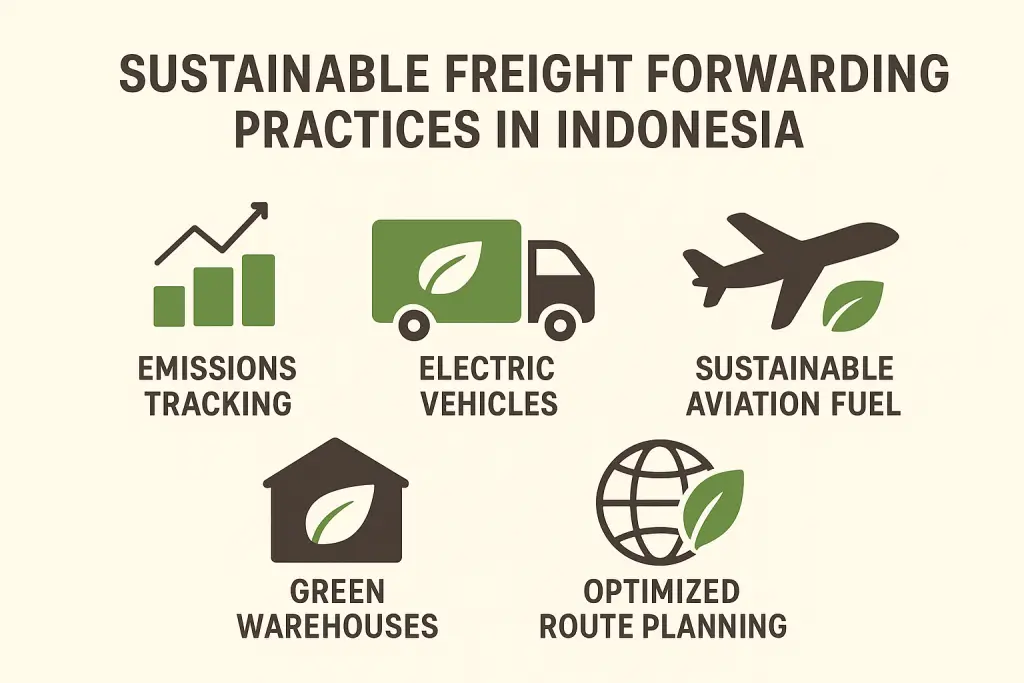As global awareness of environmental issues increases, the logistics sector in Indonesia is embracing sustainable freight forwarding practices. Sustainable or green freight forwarding involves implementing strategies that reduce carbon emissions, minimize waste, and promote resource-efficient transportation.
Why Sustainability Matters in Freight Forwarding
Freight forwarding traditionally relies on fossil fuels for transport via ships, trucks, and airplanes, contributing significantly to greenhouse gas (GHG) emissions. Indonesia, with its strategic maritime routes and rapid economic growth, plays a crucial role in balancing development with environmental responsibility.
Adopting sustainable freight forwarding practices helps businesses and forwarders reduce their environmental footprint, comply with emerging regulations, and meet rising customer expectations for eco-friendly operations.

Key Sustainable Practices in Indonesia’s Freight Forwarding
-
Emissions Monitoring & Reporting
Many companies now use digital tools to track CO₂ emissions generated per shipment. Platforms like EcotransIT help calculate, report, and manage emissions across air, sea, and land transport modes. -
Sustainable Transport Modes
Freight forwarders invest in cleaner transportation options such as electric trucks, vehicles powered by compressed natural gas (CNG), liquefied natural gas (LNG), and biodiesel. Shipping companies are also adopting cleaner fuels like Sustainable Aviation Fuel (SAF). -
Green Warehousing and Facilities
Implementation of energy-efficient designs, use of photovoltaic systems, and rainwater utilization in warehouses reduces overall operational carbon footprints. -
Optimized Route Planning
Using AI and smart logistics, freight forwarders develop routing solutions that cut unnecessary journeys and improve load optimization, saving fuel and decreasing emissions. -
Collaboration with Eco-conscious Partners
Many logistics players cooperate with programs like the Clean Cargo Working Group that encourages transparency and reduction of environmental impacts.
Government Support and Challenges
Indonesia is making strides with regulations to support green logistics, such as requiring low-sulfur fuel use and incentives for adopting cleaner technologies. However, industry stakeholders emphasize the need for stronger government incentives to accelerate adoption, like tax breaks or subsidies for electric vehicles in logistics.
Moreover, infrastructure gaps—especially in remote areas—pose challenges for uniform implementation of sustainable practices nationally.
Why Choose Sustainable Freight Forwarding?
-
Aligns business with global climate goals and regulatory trends
-
Enhances corporate social responsibility profiles
-
Potentially reduces long-term operational costs through efficiency
-
Meets growing market demand for environmentally responsible shipping
Alfian Logistics Commitment to Sustainability
At Alfian Logistics, sustainability is integrated throughout our freight forwarding and logistics processes, from fuel-efficient transports to green warehousing and transparent emissions monitoring.
(Internal Link: Learn about our sustainable logistics initiatives)
External References
-
Rhenus Indonesia on sustainability solutions for freight forwarding: Logistics Manager article
-
Overview of green logistics challenges in Indonesia: Bisnis.com article
-
Ministry of Transportation endorsing green shipping: Antara News

